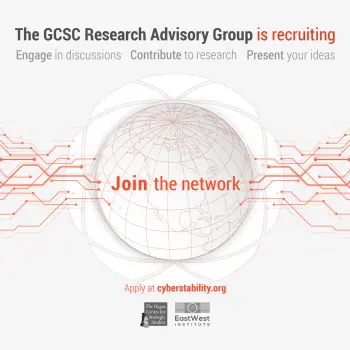The Research Advisory Group (RAG) fulfills a critical research and execution element of the Global Commission on the Stability of Cyberspace. It functions as the Commission’s academic backbone and links the latter to the wider research community. The RAG engages in scientific research to support the deliberations and publications of the Commissioners and, through its outreach and community engagement, also fulfills a crucial advocacy mission of the Commission.
Members are able to respond to requests for proposals commissioned by the GCSC, as well as generate their own ideas for further enquiry. Select members will also be invited to provide testimony to the Commission at the Full Commission Meetings (twice per year).
The core interaction of the Research Advisory Group is founded on four email lists that correlate to the key subject areas that the Commission focusses its work on. Each list is moderated by a RAG Deputy Chair.
International Peace and Security of Cyberspace (RAG-P), moderated by Deputy Chair Mr. Hugo Zylberberg.
Mail: rag-p@cyberstability.org
Internet Governance (RAG-I), moderated by Deputy Chair Ms. Marilia Maciel.
Mail: rag-i@cyberstability.org
Law (RAG-L), moderated by Deputy Chair Ms. Liis Vihul.
Mail: rag-l@cyberstability.org
Technical and Information Security (RAG-T), moderated by Deputy Chair Mr. Koichiro Komiyama.
Mail: rag-t@cyberstability.org
The Research Advisory Group is chaired by Mr. Sean Kanuck, who reports to the Commission and the Secretariat, and participates in all Commission meetings.
Interested in joining the Research Advisory Group?
The Commission is currently looking to recruit researchers and experts to join the Research Advisory Group. Interested parties should send an application email to the preferred RAG email list from the mail address you want to subscribe, with the following information:
An introduction of yourself
An introduction of your affiliation(s)
A summary of your particular research interest(s)
The application email will only be sent to the respective moderator to help them assess your interest and relevance to the list, and will not be made public (you will be asked to introduce yourself to the list in a second step).
Please do not attach any documents to the message. Applicants are encouraged to include a link to their institutional biography. If you are not using your official email address please make sure to provide additional information and a personal note to help us ascertain your identity. If the moderator cannot be reasonably sure of the identity of the applicant and their relevance for the Research Advisory Group, they will turn down the application.
Please note that you will have to apply for each list individually.
It may take up to 1 week to respond to registration enquiries. Please be sure to check your spam folder regularly.
The benefits of RAG membership
Members of the Research Advisory Group are counted on to contribute to the Commission’s deliberations via the four mailing lists. By proposing topics of interest, informing about and commenting on new developments, or putting forward novel analysis or critique, the hope is that the Commissioners will be made aware of issues that they thus far have not considered. RAG members therefore have an important “framing” input to the work of the Commission.
Institutional members are invited to respond to Requests for Proposals (RFPs) that are published within their respective list. In most cases, the RFPs will solicit shorter documents to directly support the deliberations of the Commission (around 5.000 words). Occasionally, research papers that explore an issue in depth (15.000 words or more, without summary and or appendices) will be requested. The proposal process is quick and uncomplicated, although for legal reasons, contracting with legal persons (i.e. acknowledged institutions) is preferred. Successful applicants will be working with individual Commissioners in preparing the final product. The RFPs will be mailed out to individual lists, and then later uploaded to the website.
In exceptional cases, if the work is of particular and overriding interest to the Commission and receives a rough consensus endorsement, it will be posted on the GCSC website.
Particularly engaged members of the RAG will be nominated to provide testimony at a biannual Commission Hearing, with all travel costs covered.
The communiqué of the First Full Commission Meeting in Tallinn, including the prioritized topics of research of the Commission and the respective Request for Proposals will be published in the email lists before 5 July 2017. This will give an overview of the GCSC research priorities, and give institutional members the opportunity to get directly involved in the research of the Commission.
The RAG clusters and email lists
1. International Peace and Security of Cyberspace (RAG-P): rag-p@cyberstability.org
This cluster covers the (geo)political and military dimensions that affect the stability on and of cyberspace. It will mostly focus on responsible state behavior – examples can include systemic threats from international conflict to the stability of cyberspace, espionage and preparation of the battlefield, the stockpiling of zero-days, matters of attribution, political norms of behavior, and confidence-building measures. The impact of non-state actors and the private sector as relevant for International Peace and Security (IPS) issues will also be included when considered relevant – examples can include data protection frameworks, encryption issues as well as international cooperation between the public and the private sector. IPS issues (related to the UN First Committee on disarmament and international security) are a primary focus of the Commission, so this cluster will be further supported by the Chair of RAG, Sean Kanuck. The Deputy Chair and moderator of the list is Hugo Zylberberg, Cyber Fellow at Columbia University’s School of International and Public Affairs and a member of the Castex Chair of Cyber Strategy in Paris.
2. Internet Governance (RAG-I): rag-i@cyberstability.org
This cluster covers the issues and development pertaining to Internet governance and the evolution of the Internet. The GCSC aims to influence international peace and security, not Internet governance – the focus of the initiative is on work generally conducted in the First Committee of the UN, so-called “international cybersecurity”. Internet governance has its independent processes with its own goals and institutions (i.e. ICANN, ISOC, etc), but at the same time the field can provide vital input into the wider IPS discussion. Also, some states addressing international cybersecurity issues routinely attempt to bring in questions of Internet governance, and often introduce uncertainty among the IPS actors as to the role and responsibility of the different institutions in technical and policy Internet governance. This cluster is mainly intended for the Internet governance community to help better communicate and interact with the IPS community, and is moderated by Marilia Maciel, Digital Policy Senior Researcher at DiploFoundation.
3. Law (RAG-L): rag-l@cyberstability.org
The Law cluster considers various legal issues pertaining to the stability and security of cyberspace. It deals with matters of both domestic and international law. Topics that are of relevance include understanding how existing law applies to cyberspace; identifying areas that demand legal regulation; ascertaining national and regional differences in domestic law as well as in approaches to international law; examining possible conflicts and synergies between domestic and international legal regimes; and determining mechanisms for improving compliance with the law. Moreover, the identification of legal norms will help focus and conserve efforts by avoiding the need to develop political norms regarding which legal norms already exist. Ultimately, the cluster will help to both sensitize the Commission to the range of legal opinion on various issues in cyberspace and support its efforts to advance international peace, security and stability in cyberspace through domestic and international law. The Law cluster is primarily intended for legal experts and is moderated by Liis Vihul, founder of Cyber Law International, the managing editor of the Tallinn Manual 2.0, and Ambassador of the NATO Cooperative Cyber Defence Centre of Excellence.
4. Technical and Information Security (RAG-T): rag-t@cyberstability.org
This cluster covers the technical aspects of cyberstability – examples can include the technical core protocols and standards of the internet, management and protection of critical information infrastructures and essential web services, threats, risks and their vectors, and any matters pertaining to network and information security. Technical RAG members are particularly encouraged to help explain the structure and contribution of the wider security community to combating all types of cyber-threats, and help ensure that the IPS community is appraised of some of these existing community features, their strengths and limitations. It is mainly intended for the InfoSec and technical community, and is moderated by Koichiro Komiyama, Deputy Director of the Global Coordination Division at JPCERT/CC.
About the GCSC
The Global Commission on the Stability of Cyberspace (GCSC) will develop proposals for norms and policies to enhance international security and stability and guide responsible state and non-state behaviour in cyberspace. The GCSC will engage the full range of stakeholders to develop shared understandings and its work will advance cyber stability by (i) supporting information exchange and capacity building, (ii) research, and (iii) advocacy.
The deciding element of the Commission are the Commissioners, distinguished individuals who have worked on different aspects of the security and stability of cyberspace. The Commission is a self-nominated volunteer body that sets its own agenda and work schedule. The Commission is supported by a Secretariat – led by The Hague Centre for Strategic Studies (which started the initiative with support of the Netherlands Ministry of Foreign Affairs) and the East West Institute. Key financial supporters are included in the Management Board, which, however, does not have an agenda setting function.







